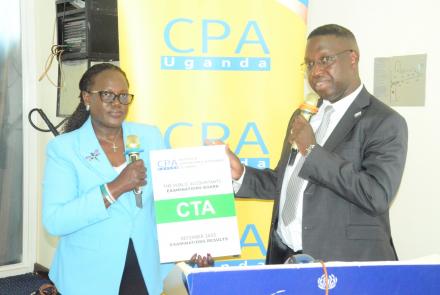By Caroline Nassuuna
Communications Officer
Accountants have been challenged to take centre stage in driving Uganda’s transition to a green economy through sustainable finance practices and climate accountability. The discussions took place at the 13th CPA Economic Forum on 9 July 2025, at the Imperial Resort Beach Hotel.
The discussions on green financing were led by CPA Patricia Ojangole – Managing Director, Uganda Development Bank (UDB) and Denis Mugagga – Head of Climate Finance Unit at the Ministry of Finance, Planning and Economic Development. They focused on equipping finance professionals with practical policies and financing pathways to advance environmental sustainability and climate resilience.
According to CPA Ojangole, transitioning to a green economy requires adopting and scaling up financing mechanisms that mobilise resources while minimising risk. She called for structured frameworks to facilitate private sector participation, such as carbon market regulations and incentive-driven investment partnerships.
“Developing countries like Uganda remain vulnerable to climate change due to high population growth, poor waste management, urban pollution, over-reliance on fossil fuels, and weak industrial policies,” noted CPA Ojangole.
She highlighted that Uganda needs at least USD 28.1 billion to implement its Nationally Determined Contributions (NDCs), calling for urgent alignment between the financial sector and national green growth objectives. According to Dr. Ojangole, green financing should prioritise sectors like climate-smart agriculture, clean energy, sustainable transport, and resilient infrastructure.
In addition, Mugagga stressed the accountant’s role in embedding Environmental, Social, and Governance (ESG) principles and climate-related disclosures into core financial processes. He advocated for the adoption of internationally recognised standards such as the IFRS Sustainability Disclosure Standards (S1 and S2), the Global Reporting Initiative and the Carbon Disclosure Project.
“Green budgeting, climate tagging in public finance, and independent audits of emissions and carbon offset integrity are no longer optional. They are necessary for credible carbon markets and transparent climate finance systems,” Mugagga noted.
He also outlined ongoing government initiatives to support climate finance, including the recently approved National Climate Finance Strategy, the forthcoming National Green Taxonomy, and Uganda’s first-ever Carbon Market Regulations launched in May 2025. A proposed National Climate Financing Vehicle (NCFV) is set to function as a multi-donor trust fund to channel investments into high-impact green projects.
The forum’s climate finance discussions underscored the urgency of mainstreaming sustainability into the accountancy profession, turning accountants into catalysts for climate-smart policies, resilient investments, and transparent green reporting.
The CPA Economic Forum is ICPAU’s flagship platform for addressing critical economic issues that impact the accountancy profession and the wider business landscape. Over the years, ICPAU has consistently provided policy recommendations and tax proposals to the Government through the Ministry of Finance, Planning and Economic Development, contributing to meaningful national reforms.
The 13th CPA Economic Forum is organised by ICPAU in partnership with Bank of Uganda, Uganda National Oil Company (UNOC), National Agricultural Research Organisation (NARO), Uganda Printing and Publishing Corporation (UPPC), Electoral Commission, Centenary Bank, Uganda Electricity Generation Company Limited (UEGCL), National Social Security Fund (NSSF), Stanbic Bank, PKF Uganda, Prudential Assurance Uganda Limited and MTN.





